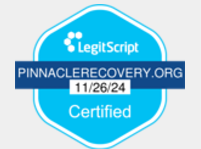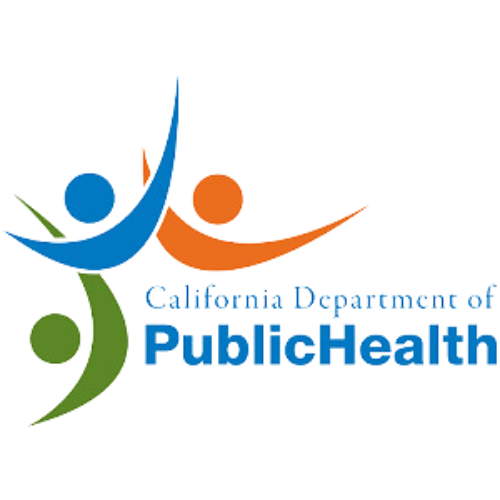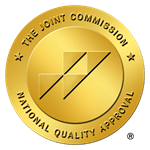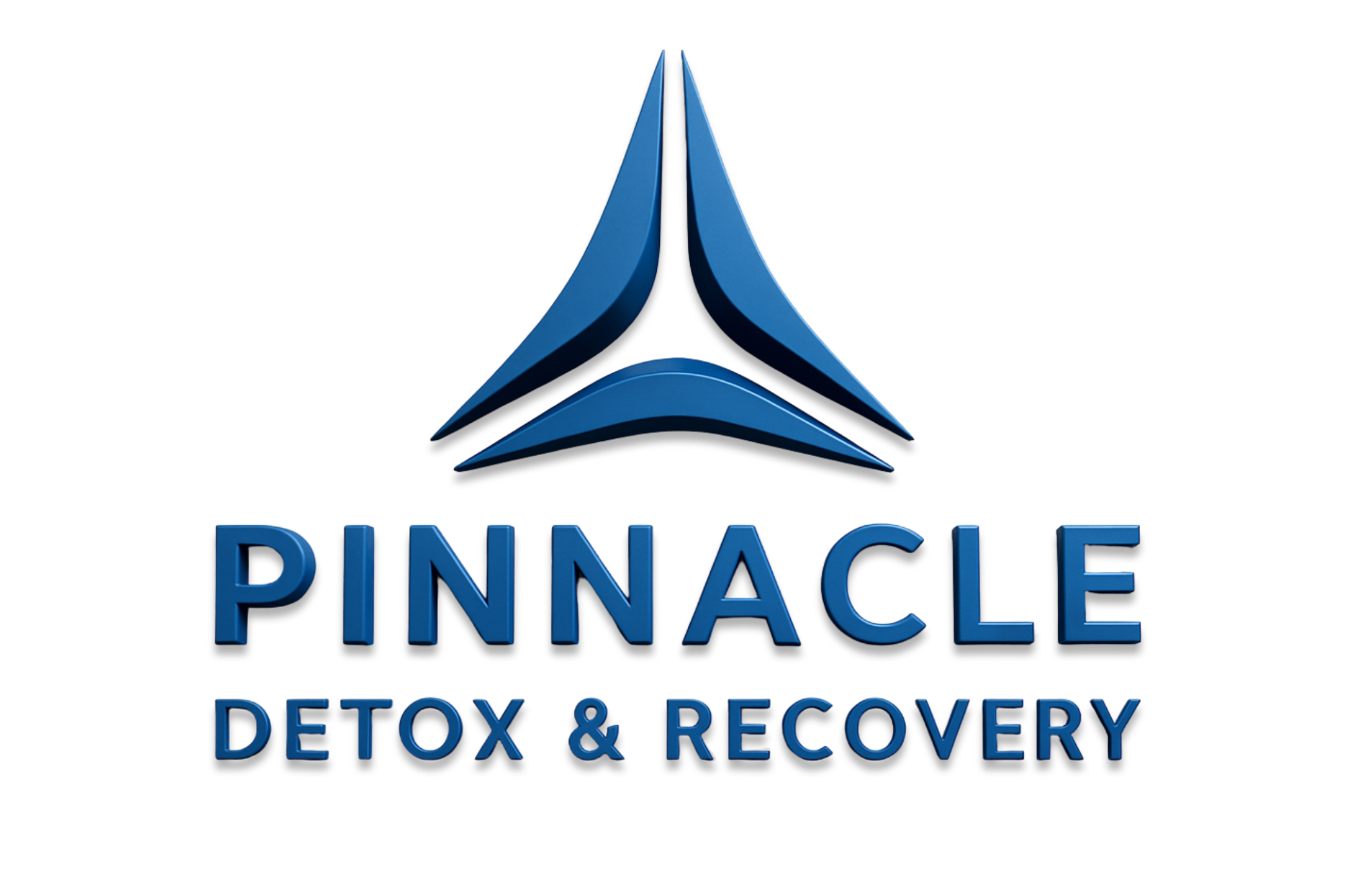Seven key foods can notably support your body's healing during drug recovery. You'll benefit from lean proteins like chicken and fish that repair tissue damage, while omega-3-rich salmon helps restore brain chemistry. Antioxidant-packed leafy greens aid detoxification, and fermented dairy products improve gut health and nutrient absorption. Complex carbohydrates stabilize blood sugar, nuts provide essential minerals, and colorful fruits amplify immune function. Understanding these nutritional components can empower your recovery path.
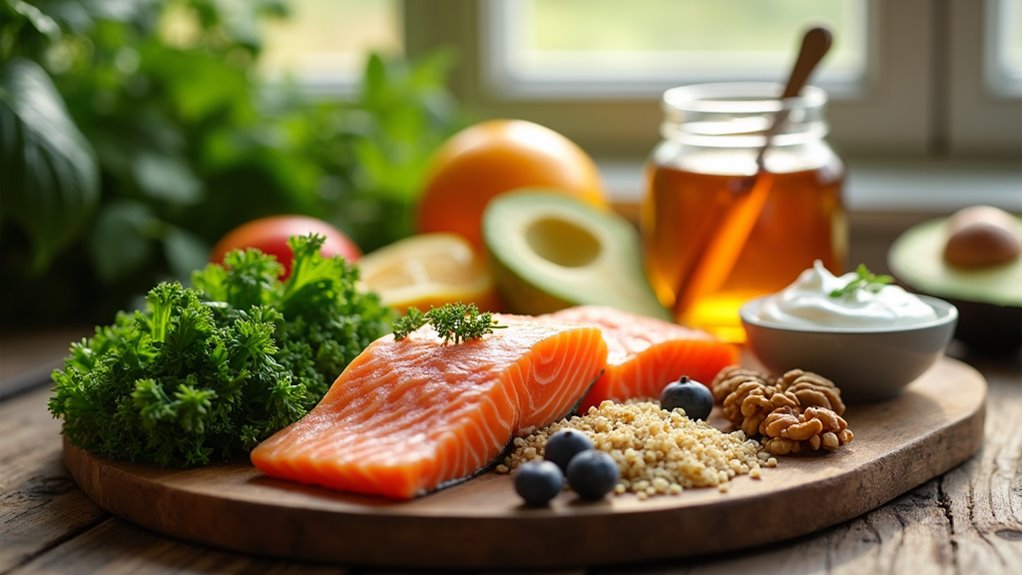 While substance abuse takes a severe toll on physical and mental health, proper nutrition serves as a cornerstone of successful recovery. During addiction, your body experiences significant nutrient deficiencies and metabolic disruptions that affect vitamin absorption, hormone regulation, and organ function. Research shows that amino acids may help reduce the risk of relapse. You'll likely face challenges with malnutrition, compromised immunity, and unstable blood sugar levels. Many individuals suffering from addiction tend to consume less nutritious foods and skip essential food groups like vegetables and fruits.
Developing healthy eating habits through nutritional counseling directly impacts your recovery success. Research shows that proper nutrition helps stabilize your mood, reduce anxiety, and improve sleep quality, all critical factors in preventing relapse. Your brain's neurochemistry benefits from essential nutrients that support tissue repair and cognitive function. When you restore nutritional balance, you're strengthening both your physical resilience and mental wellness, creating a stronger foundation for long-term sobriety. If you're having trouble accessing recovery resources, you may need to contact support teams to resolve any security-related blocks preventing website access.
While substance abuse takes a severe toll on physical and mental health, proper nutrition serves as a cornerstone of successful recovery. During addiction, your body experiences significant nutrient deficiencies and metabolic disruptions that affect vitamin absorption, hormone regulation, and organ function. Research shows that amino acids may help reduce the risk of relapse. You'll likely face challenges with malnutrition, compromised immunity, and unstable blood sugar levels. Many individuals suffering from addiction tend to consume less nutritious foods and skip essential food groups like vegetables and fruits.
Developing healthy eating habits through nutritional counseling directly impacts your recovery success. Research shows that proper nutrition helps stabilize your mood, reduce anxiety, and improve sleep quality, all critical factors in preventing relapse. Your brain's neurochemistry benefits from essential nutrients that support tissue repair and cognitive function. When you restore nutritional balance, you're strengthening both your physical resilience and mental wellness, creating a stronger foundation for long-term sobriety. If you're having trouble accessing recovery resources, you may need to contact support teams to resolve any security-related blocks preventing website access.
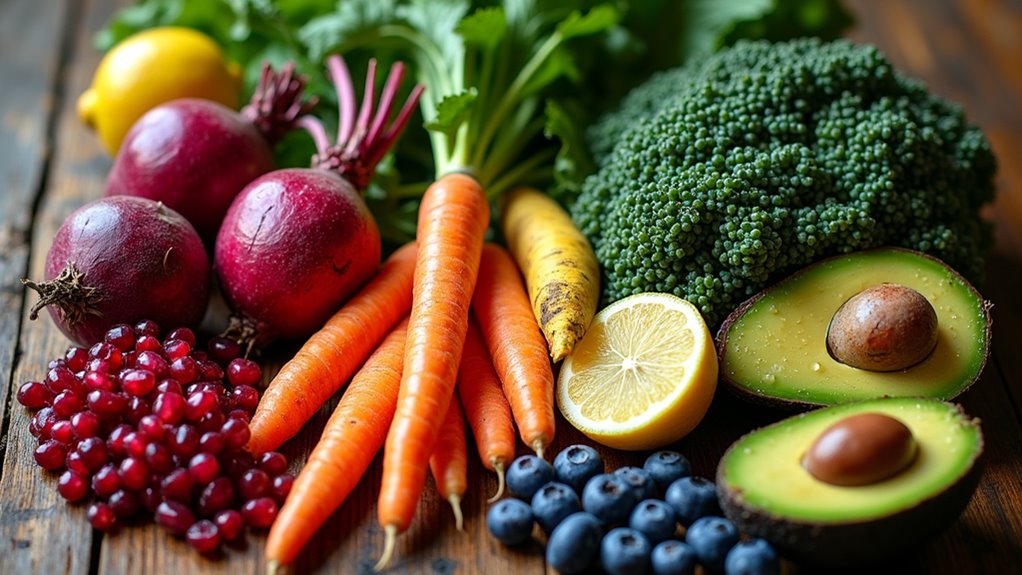 During drug recovery, your body's detoxification processes heavily depend on antioxidant-rich fruits and vegetables. The antioxidant pigments in leafy greens, particularly chlorophyll, support liver function and augment toxin removal. Cruciferous vegetables like broccoli and Brussels sprouts activate detoxifying enzymes while providing essential folate for cellular repair. These beneficial compounds protect the body from disease and help maintain optimal function, similar to how they defend plants in nature. White foods like garlic and onions provide strong immunostimulants that help fight inflammation and support overall healing.
Since only 1 in 10 adults consumes enough vegetables daily, focusing on increasing intake during recovery is especially crucial. The nutrient density of colorful produce offers targeted healing benefits. Blue and purple foods contain anthocyanins that reduce inflammation and support tissue recovery. Orange and yellow varieties provide beta-carotene and other carotenoids that strengthen immune function and aid digestive healing. Green superfoods like wheatgrass and spirulina amplify detoxification pathways. Together, these plant pigments work synergistically to neutralize free radicals, repair cellular damage, and optimize your body's natural cleansing mechanisms during recovery.
During drug recovery, your body's detoxification processes heavily depend on antioxidant-rich fruits and vegetables. The antioxidant pigments in leafy greens, particularly chlorophyll, support liver function and augment toxin removal. Cruciferous vegetables like broccoli and Brussels sprouts activate detoxifying enzymes while providing essential folate for cellular repair. These beneficial compounds protect the body from disease and help maintain optimal function, similar to how they defend plants in nature. White foods like garlic and onions provide strong immunostimulants that help fight inflammation and support overall healing.
Since only 1 in 10 adults consumes enough vegetables daily, focusing on increasing intake during recovery is especially crucial. The nutrient density of colorful produce offers targeted healing benefits. Blue and purple foods contain anthocyanins that reduce inflammation and support tissue recovery. Orange and yellow varieties provide beta-carotene and other carotenoids that strengthen immune function and aid digestive healing. Green superfoods like wheatgrass and spirulina amplify detoxification pathways. Together, these plant pigments work synergistically to neutralize free radicals, repair cellular damage, and optimize your body's natural cleansing mechanisms during recovery.
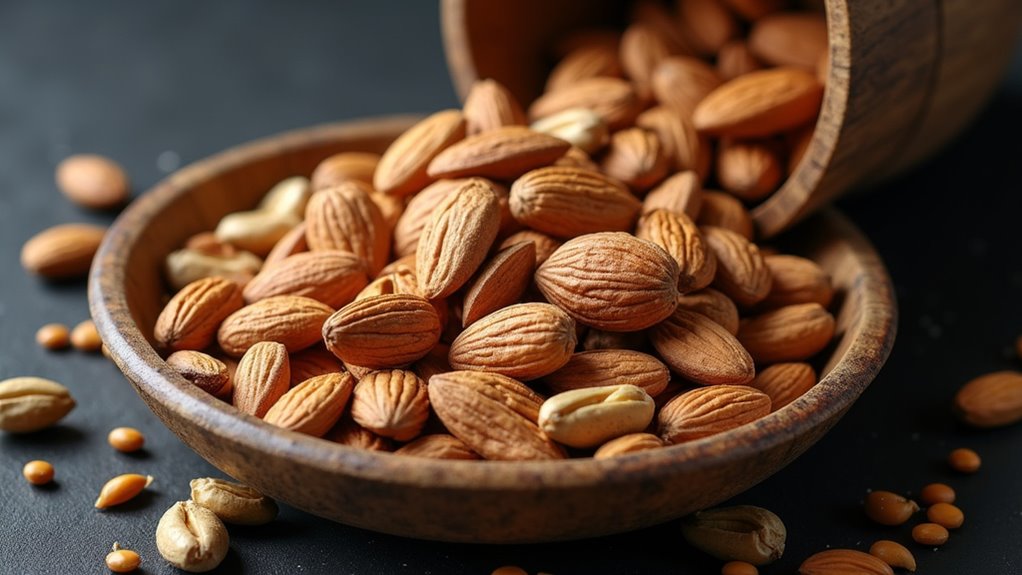 Your body's recovery process can benefit greatly from nuts and seeds, which contain high levels of magnesium that support neurotransmitter function and brain repair. These nutrient-dense foods provide sustained energy through their healthy fat content, helping stabilize blood sugar and reduce fatigue during rehabilitation. The combination of protein, fiber, and essential nutrients in nuts and seeds helps fight substance cravings by maintaining steady glucose levels and supporting the production of mood-regulating chemicals like serotonin and dopamine.
Your body's recovery process can benefit greatly from nuts and seeds, which contain high levels of magnesium that support neurotransmitter function and brain repair. These nutrient-dense foods provide sustained energy through their healthy fat content, helping stabilize blood sugar and reduce fatigue during rehabilitation. The combination of protein, fiber, and essential nutrients in nuts and seeds helps fight substance cravings by maintaining steady glucose levels and supporting the production of mood-regulating chemicals like serotonin and dopamine.
Why Nutrition Matters in Recovery

Essential Protein Sources for Healing
Rebuilding your body's protein stores marks a key step in healing from substance abuse. You'll find essential amino acids for recovery in both animal and plant sources. Lean meats like chicken, turkey, and fish provide complete proteins that support tissue repair, while balancing amino acids for recovery through L-glutamine content. Meal planning lessons in treatment centers teach optimal protein timing and portions for recovery. Healing with functional proteins becomes more effective when you incorporate diverse sources. Plant-based options like legumes, tofu, and nuts deliver pivotal proteins while supporting neurotransmitter balance. Dairy products and fermented alternatives contribute to gut health and immune system restoration. The digestive system repairs gradually with increased protein intake and sobriety. Working with healthcare professionals helps create protein-rich meal plans tailored to your specific recovery needs. For ideal neurological recovery, focus on proteins rich in tyrosine and omega-3s, found in fish, eggs, and cheese. These support dopamine synthesis and help stabilize mood while reducing unhealthy food cravings during your restorative process.Colorful Fruits and Vegetables for Detoxification

Brain-Boosting Omega-3 Rich Foods
You'll find essential brain-supporting omega-3s in fatty fish like salmon and mackerel, which can help repair neural pathways and reduce inflammation during recovery. Including walnuts and other nuts to your diet provides alpha-linolenic acid (ALA), supporting cognitive function and neuroplasticity as your brain heals. Research suggests that consuming at least 2 grams of omega-3s daily provides optimal brain-boosting benefits for recovery and healing. Studies indicate higher hemoglobin levels during cognitive activities with fish oil supplementation, suggesting improved brain blood flow. Incorporating seeds such as flaxseeds and chia seeds offers supplementary omega-3s that augment memory and mental clarity while safeguarding against oxidative stress during the recovery process. These omega-3-rich foods are particularly important since they help maintain membrane fluidity in brain cells, which is crucial for proper neural function and recovery.Fish For Mental Recovery
Fish rich in omega-3 fatty acids play a vital role in mental recovery during drug rehabilitation, particularly through their EPA and DHA content. Clinical research demonstrates that EPA-dominant formulations can significantly reduce depression symptoms, while DHA supports brain structure and cognitive function during recovery. Research suggests that fish oil supplements can enhance the effectiveness of traditional antidepressant medications. These essential fatty acids are particularly important because they act as competitive inhibitors of omega-6 fatty acids, helping reduce inflammation throughout the body and brain. Meta-analyses have shown that small to modest improvements in depression occur with omega-3 supplementation.- Consume 2-3 servings of fatty fish weekly, focusing on salmon, mackerel, sardines, and herring for the best omega-3 intake
- EPA shows superior benefits for mental health improvements compared to DHA, particularly at doses ≤1g/day
- DHA constitutes up to 20% of brain fatty acids, supporting membrane fluidity and neural signaling
- Omega-3s help reduce inflammation, boost synaptic plasticity, and modulate neurotransmitter function
Nuts Support Brain Function
While fish provide essential omega-3s for recovery, nuts, particularly walnuts, offer a powerful plant-based alternative through their rich alpha-linolenic acid (ALA) content. Clinical studies show that consuming nuts boosts memory, attention span, and mental processing, pivotal elements for your recovery journey. Research supports including a variety like walnuts, almonds, Brazil nuts, and pecans to amplify cognitive benefits. To optimize absorption, you'll want to focus on proper nut preparation methods. Consider grinding or chopping your nuts, which can improve digestion and ALA absorption. Aim for 1-1.5 ounces (about 12-18 walnut halves) daily. This serving size provides ideal brain-supporting nutrients without excess calories. The omega-3s in nuts protect your neurons, reduce inflammation, and combat oxidative stress - all essential mechanisms for healing during withdrawal and recovery.Seeds Boost Cognitive Health
Seeds complement nuts as powerful brain-boosting allies during recovery, offering concentrated sources of alpha-linolenic acid (ALA) and other cognitive-enhancing compounds. Research demonstrates that incorporating seed variety into your diet supports cognitive function through multiple mechanisms, including reduced neuroinflammation and enhanced blood flow to your brain.- Flaxseeds lead plant sources with 2.35g ALA per tablespoon, supporting memory formation and information retention
- Chia seeds deliver 5g ALA per ounce, helping protect against cognitive decline
- Hemp seeds provide an ideal 3:1 omega-6 to omega-3 ratio for brain health
- Pumpkin and sesame seeds contribute additional micronutrients for thorough support
Dairy Products for Bone and Gut Health
Dairy products serve as pivotal dietary components during drug recovery, delivering substantial bone-protective benefits through multiple mechanisms. You'll benefit from dairy's calcium and protein content, which provides 50-60% and 20-30% of your daily requirements, respectively, supporting bone mineral density and reducing fracture risk. Nutrient-rich fermented dairy products like yogurt and kefir offer additional advantages through digestibility-improving probiotics. These beneficial bacteria, including Lactobacillus and Bifidobacterium, regulate gut barrier function and reduce inflammation, essential factors during recovery. Research shows that consuming fermented dairy correlates with up to 32% lower hip fracture risk and improved bone turnover markers. Your gut health particularly benefits from dairy's bioactive compounds and probiotic content, which normalize transit time and boost nutrient absorption, supporting your body's healing processes during recovery.Power-Packed Nuts and Seeds

Brain-Boosting Magnesium Benefits
Powerful magnesium-rich nuts and seeds play an essential role in neurological recovery during drug rehabilitation. Through neuroprotective mechanisms, magnesium supplementation supports your brain's healing process by maintaining neuronal health and reducing inflammation. Research demonstrates magnesium's critical benefits for recovery:- Boosts cognitive function and memory by supporting neurotransmitter synthesis and cellular energy metabolism
- Diminishes anxiety and regulates stress response by modulating serotonin and dopamine transmission
- Protects your blood-brain barrier integrity while promoting healthy cerebral blood flow
- Augments brain-derived neurotrophic factor (BDNF), essential for neuroplasticity during recovery
Healthy Fat Energy Source
A strategic selection of nuts and seeds provides essential healthy fats that fuel your body's recovery from substance abuse. These nutrient-dense foods deliver concentrated energy while offering superior mineral density through magnesium, zinc, and iron—crucial elements for cellular repair and nerve function. Nut/Seed | Benefits ---------|---------- Almonds | High vitamin E, supports immune health Flaxseeds | Rich omega-3s, reduces inflammation Pumpkin Seeds | Zinc-rich, aids tissue repair Walnuts | Brain-protective antioxidants Chia Seeds | Fiber-rich, promotes satiety benefits You'll experience sustained energy levels due to the combination of healthy fats and protein, which helps stabilize blood sugar and reduce unhealthy cravings. These portable powerhouses support hormone synthesis and neurotransmitter production, directly impacting your mood stability and recovery success. Their anti-inflammatory properties also protect your cells from oxidative damage while promoting tissue healing.Fighting Cravings With Nutrients
Strategic consumption of nuts and seeds during recovery targets five key neurotransmitter pathways that directly combat substance cravings. These nutrient-dense foods promote stable blood sugar regulation while delivering essential compounds for emotional stability during recovery.- Raw nuts supply tryptophan and tyrosine, dramatically increasing serotonin and dopamine production to reduce withdrawal-linked mood fluctuations
- Omega-3 fatty acids from seeds strengthen brain health and mental resilience against addictive urges
- Magnesium-rich options like flax and chia seeds amplify serotonin synthesis for improved mood balance
- Slow-digesting proteins and healthy fats maintain steady glucose levels, preventing hypoglycemic crashes that can trigger cravings
